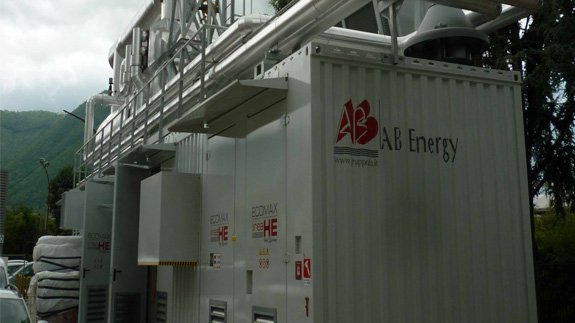Once again, the Orzinuovi based Industrial Group proves itself to be a complete partner for the energy efficiency optimization of the pasta factory supply chain, adding value to the technological and application potential of natural gas fueled cogeneration.
This prestigious company from Campania (Gragnano, near Naples), renowned for its responsible approach toward product quality and land policies, chose AB based on the awareness of how trigeneration should combine energy cost optimization and concrete commitment to the environment.
For over two centuries, “Garofalo” has been synonymous with Gragnano pasta, which is among the best known worldwide and a symbol of Mediterranean taste. Accordingly, it chose CHP to safeguard the excellence of its product and the quality of its supply chain.
AB technicians installed a high efficiency ECOMAX® 26HE trigeneration plant in the Gragnano pasta factory, configuring it specifically to facilitate integration with the existing systems of the Garofalo factory.
The plant consists of a container module and a lithium bromide absorber and has a total power of 2,651 kWe. The total thermal power output is 2,482 kWt; 1.314kW are produced via heat recovery from the hot water production engine block, whereas 1.168kW come from the recovery of fumes via overheated water boiler. The hot water circuit is used to supply primary users via an absorber (trigeneration) with a maximum 633 kWf cooling capacity output, for the production of chilled water, whereas secondary users are served via a heat exchanger for the production of 70° C hot water. A high efficiency Jenbacher (GE Group) engine is used.
The electricity is entirely self-consumed by the factory, with generator control set to zero exchange mode with the network to prevent power from being transferred into the grid at night when the pasta factory is not operating at full speed. Thermal energy is entirely self-consumed as well: whether overheated or chilled, water is involved in the production of pasta (food processes, temperature control of the areas where the pasta is produced, etc.); additionally, part of the hot water is used for space heating in the winter months.
These technological choices allowed for high yields on all operating parameters, greatly reducing the release of CO2 into the environment.
Once the feasibility plan was approved, the plant was installed and became operational in a few months. Specialized AB personnel took care of the installation making sure not to slow down the factory’s production flow.
The plant is expected to be in use for 8000 hours/year with 100% nominal electrical load, 100% heat recovery on the hot water circuit fueled with the heat resulting from the cooling of jackets, oil and intercoolers, and an estimated 100% heat recovery from exhaust gas.
The overall efficiency of the plant exceeds 85%.
This is a promoted article.





